Frédéric Duvallès (1884-1971) was a popular French comedian who had a rich career in French sound cinema of the 1930s and 1950s. Examples are L'héritier du Bal Tabarin (Jean Kemm, 1933), Train de plaisir (Léo Joannon, 1936), and Vacances payées (Maurice Cammage, 1938), in all three he had the lead. Small and thin, Duvallès has a versatile physique and could play both valets and authorities such as bailiffs and priests. All in all, he acted in some 46 films.

French postcard in the 'Nos artistes dans leur loge' series, no. 181. Photo: Comoedia, Paris.
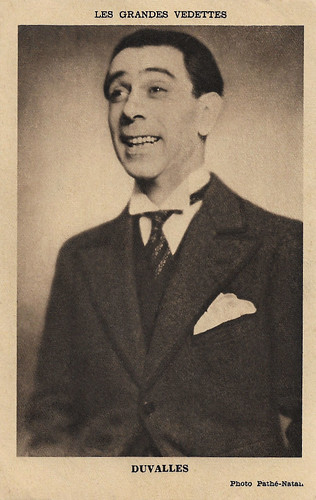
French postcard in the Les Grandes Vedettes series by Radiogravures A. Breger Frères, Paris. Photo: Pathé-Nathan.
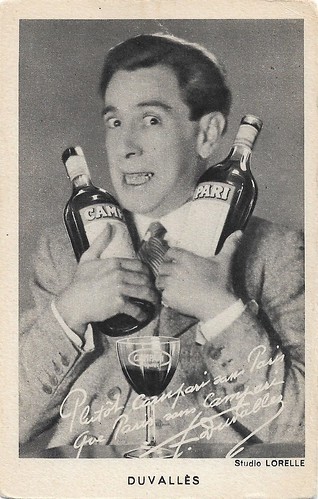
French postcard by David Campari, Paris. Photo: Studio Lorelle. Caption: Rather Campari without Paris, than Paris without Campari.
Frédéric Duvallès was born Charles Frédéric Coffinieres in Paris in 1884. His father was a lawyer. Frédéric moved from Paris to Marseille, for his stage debut at the Théâtre du Gymnase, in 1908. He went on tour around the world. He was often credited as Duvallès
During WW I, he showed remarkable bravery which earned him the Croix de Guerre and the Military medal and he was named Officer of the Legion of Honor. After the war, he acted on the stage of the Palais-Royal. During the interwar period, he played supporting roles in plays by Labiche, Feydeau, and others.
He made his film debut in the comedy La merveilleuse journée/The Wonderful Day (Yves Mirande, Robert Wyler, 1932) in which he co-starred with André Alerme, Florelle, and Milly Mathis. It was a remake of the silent film, La merveilleuse journée/The Wonderful Day (René Barberis, 1929) and both were based on a play by Yves Mirande.
He appeared opposite Elvire Popesco and André Lefaur in the comedy Dora Nelson (René Guissart, 1935). In the comedy Le roi/The King (Pierre Colombier, 1936) starring Victor Francen and Raimu, he had only a supporting part.
Then he had the lead in the romantic comedy Train de plaisir/Excursion Train (Léo Joannon, 1936), with Germaine Roger. Fernandel was his co-star in Tricoche et Cacolet/Tricoche and Cacolet (Pierre Colombier, 1938).
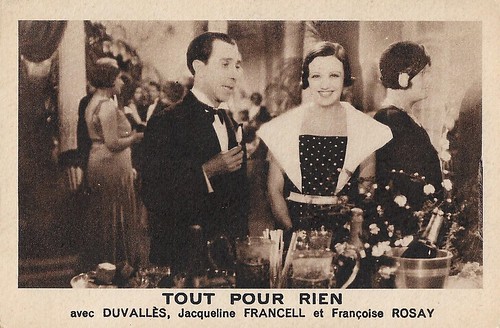
French postcard. Publicity by the Cinema Victor-Hugo (Pathé-Natan), showing 13-26 October [1933] the film Tout pour rien/All for Nothing (René Pujol, 1933), starring Frédéric Duvallès and Jacqueline Francell.
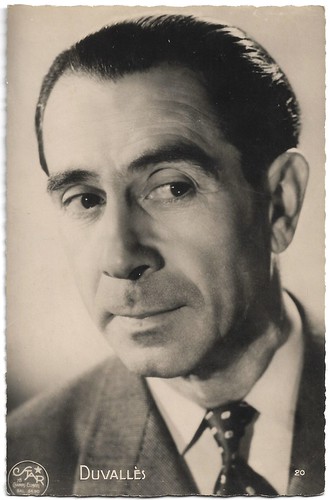
French postcard, no. 20. Photo: Star, Paris.
Then followed a long intermission in Frédéric Duvallès's film career. He returned to the screen in the comedy Folie douce (Jean-Paul Paulin, 1951) with Lisette Jambel, and with Louis de Funès in a supporting part. Then he appeared in the hit comedy Le Portrait de son père/His Father's Portrait (André Berthomieu, 1953) starring Jean Richard and Brigitte Bardot. The film recorded 1,643,820 admissions.
He co-starred with Jean Tissier in the comedy Quand te tues-tu?/When Do You Commit Suicide? (Émile Couzinet, 1953), a remake of the 1931 film of the same title. One of his best-known films is Jean Renoir's Elena et les Hommes/Elena and Her Men (Jean Renoir, 1956), starring Ingrid Bergman and Jean Marais. Duvallès played a supporting part.
Another supporting role followed in the Operetta À la Jamaïque/Love in Jamaica (André Berthomieu, 1957) starring Luis Mariano and Jane Sourza. He also appeared in the Louis de Funès comedy Ni vu, ni connu/Neither Seen Nor Recognized (Yves Robert, 1958).
He also played in the French-Italian-German thriller La chambre ardente/The Burning Court (Julien Duvivier, 1962). He played a weird old man who is a student of the black arts and lives in an ancient, cursed castle. He is visited by a group of people, including Nadja Tiller and Jean-Claude Brialy, but soon people in the group start being killed off.
His final film was the Spanish-French musical La casta Susana/Chaste Susan (Luis César Amadori, 1963). Frédéric Duvallès passed away in Paris in 1971. He was 86. He rests in the cemetery of Conflans-Sainte-Honorine.
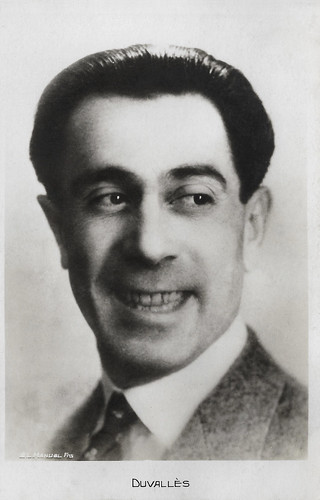
French postcard by A.N., Paris, no. 594. Photo: G.L. Manuel Frères.
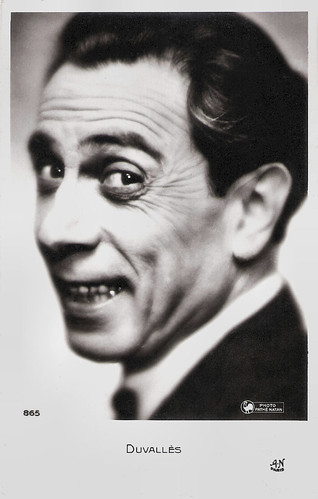
French postcard by A.N., Paris, no. 865. Photo: Pathé Natan.
Sources: Donatienne Roby (CinéArtistes - French), Wikipedia (English and French), and IMDb.
This post was last updated on 3 February 2024.

French postcard in the 'Nos artistes dans leur loge' series, no. 181. Photo: Comoedia, Paris.

French postcard in the Les Grandes Vedettes series by Radiogravures A. Breger Frères, Paris. Photo: Pathé-Nathan.

French postcard by David Campari, Paris. Photo: Studio Lorelle. Caption: Rather Campari without Paris, than Paris without Campari.
Remarkable bravery
Frédéric Duvallès was born Charles Frédéric Coffinieres in Paris in 1884. His father was a lawyer. Frédéric moved from Paris to Marseille, for his stage debut at the Théâtre du Gymnase, in 1908. He went on tour around the world. He was often credited as Duvallès
During WW I, he showed remarkable bravery which earned him the Croix de Guerre and the Military medal and he was named Officer of the Legion of Honor. After the war, he acted on the stage of the Palais-Royal. During the interwar period, he played supporting roles in plays by Labiche, Feydeau, and others.
He made his film debut in the comedy La merveilleuse journée/The Wonderful Day (Yves Mirande, Robert Wyler, 1932) in which he co-starred with André Alerme, Florelle, and Milly Mathis. It was a remake of the silent film, La merveilleuse journée/The Wonderful Day (René Barberis, 1929) and both were based on a play by Yves Mirande.
He appeared opposite Elvire Popesco and André Lefaur in the comedy Dora Nelson (René Guissart, 1935). In the comedy Le roi/The King (Pierre Colombier, 1936) starring Victor Francen and Raimu, he had only a supporting part.
Then he had the lead in the romantic comedy Train de plaisir/Excursion Train (Léo Joannon, 1936), with Germaine Roger. Fernandel was his co-star in Tricoche et Cacolet/Tricoche and Cacolet (Pierre Colombier, 1938).

French postcard. Publicity by the Cinema Victor-Hugo (Pathé-Natan), showing 13-26 October [1933] the film Tout pour rien/All for Nothing (René Pujol, 1933), starring Frédéric Duvallès and Jacqueline Francell.

French postcard, no. 20. Photo: Star, Paris.
A weird old man in an ancient, cursed castle
Then followed a long intermission in Frédéric Duvallès's film career. He returned to the screen in the comedy Folie douce (Jean-Paul Paulin, 1951) with Lisette Jambel, and with Louis de Funès in a supporting part. Then he appeared in the hit comedy Le Portrait de son père/His Father's Portrait (André Berthomieu, 1953) starring Jean Richard and Brigitte Bardot. The film recorded 1,643,820 admissions.
He co-starred with Jean Tissier in the comedy Quand te tues-tu?/When Do You Commit Suicide? (Émile Couzinet, 1953), a remake of the 1931 film of the same title. One of his best-known films is Jean Renoir's Elena et les Hommes/Elena and Her Men (Jean Renoir, 1956), starring Ingrid Bergman and Jean Marais. Duvallès played a supporting part.
Another supporting role followed in the Operetta À la Jamaïque/Love in Jamaica (André Berthomieu, 1957) starring Luis Mariano and Jane Sourza. He also appeared in the Louis de Funès comedy Ni vu, ni connu/Neither Seen Nor Recognized (Yves Robert, 1958).
He also played in the French-Italian-German thriller La chambre ardente/The Burning Court (Julien Duvivier, 1962). He played a weird old man who is a student of the black arts and lives in an ancient, cursed castle. He is visited by a group of people, including Nadja Tiller and Jean-Claude Brialy, but soon people in the group start being killed off.
His final film was the Spanish-French musical La casta Susana/Chaste Susan (Luis César Amadori, 1963). Frédéric Duvallès passed away in Paris in 1971. He was 86. He rests in the cemetery of Conflans-Sainte-Honorine.

French postcard by A.N., Paris, no. 594. Photo: G.L. Manuel Frères.

French postcard by A.N., Paris, no. 865. Photo: Pathé Natan.
Sources: Donatienne Roby (CinéArtistes - French), Wikipedia (English and French), and IMDb.
This post was last updated on 3 February 2024.
No comments:
Post a Comment